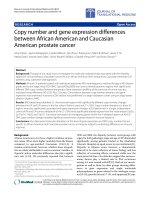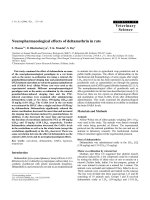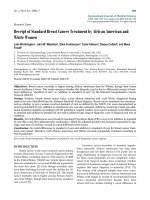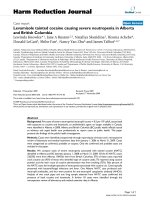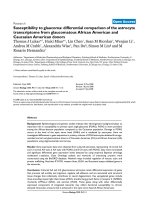American and British English(very hot).
Bạn đang xem bản rút gọn của tài liệu. Xem và tải ngay bản đầy đủ của tài liệu tại đây (195.19 KB, 7 trang )
Differences Between American and British English
( With more examples and execises with answers)
While there are certainly many more varieties of English, American and British English are the two varieties
that are taught in most ESL/EFL programs. Generally, it is agreed that no one version is "correct" however,
there are certainly preferences in use. The most important rule of thumb is to try to be consistent in your
usage. If you decide that you want to use American English spellings then be consistent in your spelling (i.e.
The color of the orange is also its flavour - color is American spelling and flavour is British), this is of course
not always easy - or possible. The following guide is meant to point out the principal differences between
these two varieties of English.
Use of the Present Perfect
In British English the present perfect is used to express an action that has occurred in the recent past that
has an effect on the present moment. For example:
I've lost my key. Can you help me look for it?
In American English the following is also possible:
I lost my key. Can you help me look for it?
In British English the above would be considered incorrect. However, both forms are generally accepted in
standard American English. Other differences involving the use of the present perfect in British English and
simple past in American English include already, just and yet.
British English:
I've just had lunch
I've already seen that film
Have you finished your homework yet?
American English:
I just had lunch OR I've just had lunch
I've already seen that film OR I already saw that film.
Have your finished your homework yet? OR Did you finish your homework yet?
Possession
There are two forms to express possession in English. Have or Have got
Do you have a car?
Have you got a car?
He hasn't got any friends.
He doesn't have any friends.
She has a beautiful new home.
She's got a beautiful new home.
While both forms are correct (and accepted in both British and American English), have got (have you got,
he hasn't got, etc.) is generally the preferred form in British English while most speakers of American
English employ the have (do you have, he doesn't have etc.)
The Verb Get
The past participle of the verb get is gotten in American English. Example He's gotten much better at playing
tennis. British English - He's got much better at playing tennis.
Vocabulary
Probably the major differences between British and American English lies in the choice of vocabulary. Some
words mean different things in the two varieties for example:
Mean: (American English - angry, bad humored, British English - not generous, tight fisted)
Rubber: (American English - condom, British English - tool used to erase pencil markings)
There are many more examples (too many for me to list here). If there is a difference in usage, your
dictionary will note the different meanings in its definition of the term. Many vocabulary items are also used
in one form and not in the other. One of the best examples of this is the terminology used for automobiles.
American English - hood British English - bonnet
American English - trunk British English - boot
American English - truck British English - lorry
Once again, your dictionary should list whether the term is used in British English or American English.
For a more complete list of the vocabulary differences between British and American English use this
Prepositions
There are also a few differences in preposition use including the following:
American English - on the weekend British English - at the weekend
American English - on a team British English - in a team
American English - please write me soon British English - please write to me soon
Past Simple/Past Participles
The following verbs have two acceptable forms of the past simple/past participle in both American and
British English, however, the irregular form is generally more common in British English (the first form of the
two) and the regular form is more common to American English.
Burn Burnt OR burned
Dream dreamt OR dreamed
Lean leant OR leaned
Learn learnt OR learned
Smell smelt OR smelled
Spell spelt OR spelled
Spill spilt OR spilled
Spoil spoilt OR spoiled
Spelling
Here are some general differences between British and American spellings:
Words ending in -or (American) -our (British) color, colour, humor, humour, flavor, flavour etc.
Words ending in -ize (American) -ise (British) recognize, recognise, patronize, patronise etc.
The best way to make sure that you are being consistent in your spelling is to use the spell check on your
word processor (if you are using the computer of course) and choose which variety of English you would
like. As you can see, there are really very few differences between standard British English and standard
American English. However, the largest difference is probably that of the choice of vocabulary and
pronunciation. For further information concerning these areas please refer to the following
more examples
1) English is my favourite subject at school. British English
2) Have you seen Dick's new truck? American English
3) The park is in the center of our town. American English
4) Mr Barnes, our caretaker, found my key. British English
5) I like French fries, they're very crispy. American English
6) Have you seen the latest movie? American English
7) I've passed this test. So I'll get my driving licence very soon. British English
8) The accident happened because the blue car didn't stop at the traffic lights. British English
9) Tom told me to get off the Underground at Tower Hill. British English
10) They have moved into a semi-detached house. British English
more examples
American British
apartment flat
argument row
baby carriage pram
band-aid plaster
bathroom loo or WC
can tin
chopped beef mince
cookie biscuit
corn maize
diaper nappy
elevator lift
eraser rubber
flashlight torch
fries chips
gas petrol
guy bloke, chap
highway motorway
hood (car) bonnet
jello jelly
jelly jam
kerosene paraffin
lawyer solicitor
license plate number plate
line queue
mail post
motor home caravan
movie theater cinema
muffler silencer
napkin serviette
nothing nought
overpass flyover
pacifier dummy
pants trousers
parking lot car park
period full stop
pharmacist chemist
potato chips crisps
rent hire
sausage banger
sidewalk pavement
soccer football
sweater jumper
trash can bin
truck lorry
trunk (car) boot
vacation holiday
vest waistcoat
windshield (car) windscreen
zip code postal code
Exercises
Exercise 1
How many differences between British and American English can you find from reading
these two short texts?
Mark (Hampshire, England)
‘I’m going to rake up the leaves in the garden, then get a DVD for tonight from the shop on
the High Street, unless you’d rather go to the cinema. There’s no point cleaning the house
now because Simon’s got his mates coming round to watch the football, and the last time
they came they left crisps all over the carpet!’
Mark (New Hampshire, United States)
‘My buddy Jim must be one of the most accident-prone people in the world. Last year he
went to hospital four times – first he broke his toe playing soccer, then he tripped over and
broke his wrist when he was walking out of a store on Main Street, then he burnt himself at
a barbecue here in our yard, then he somehow got a potato chip stuck in his throat at the
movie theatre!’
Answers :
garden/yard, shop/store, High Street/Main Street, cinema/movie theatre, mate/buddy,
football/soccer, (potato) crisp/chip



